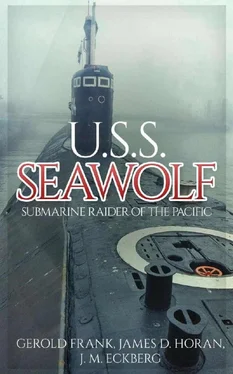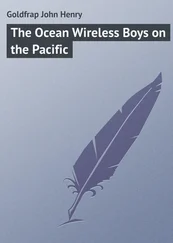One afternoon some of us were on the Cigarette Deck, the afterpart of the bridge, listening to a portable radio. We were sitting on wooden benches and lounging about, absorbing the sun.
Captain Warder climbed up from below. He was wearing shorts and undershirt and sandals.
“Hello, boys,” he said affably. And without further ado he began setting up exercises to the music. He stood there in the sun, unconcerned, arms up, arms down, bend, rise, one, two, three; one, two, three, in time to the music, giving himself the commands a little more breathlessly each time, until he was out of breath. We couldn’t help chuckling.
“Go ahead and laugh,” he said. “You’ll never see me with a bay window.”
After that, he went up on deck each afternoon when he could, and exercised. He knew how cruelly confinement can work on your body, making your legs weak, your feet swollen, your back aching, until a mile’s walk on land becomes torture.
Back in Portsmouth the Wolf received her post-shakedown overhauling. Errors in construction, defects in gears, leakages, were corrected. She was trimmed, tightened, tuned. In September we left for Newport, Rhode Island. There, for six weeks, day after day, we had extensive torpedo practice. The torpedo crews sent practice fish crashing into fictional destroyers. Nothing was overlooked. Then to New London, Connecticut, where we spent hours practicing escapes with Momsen lungs. The Wolf had proved herself; we had to prove ourselves. In peacetime, submarine crews are like boxers between bouts. They are forever in training. The fight may never come, but they train as if it were to come any moment. There are competitions and contests to keep them on their toes. Each submarine competes for records in engineering, gunnery, torpedo marksmanship, communications—every phase of submarine activity.
Marjorie had been expecting our first baby; and in April, shortly after I left with the Wolf on her shakedown cruise, Marjorie went to San Diego to rent a house, furnish it as our permanent home, and await the baby’s arrival. In New London I waited expectantly for word from San Diego. It came in October. I had no inkling of what it was when I took it, myself, in the radio shack. In Morse code a message came in. It was the Submarine Base, New London, calling the Seawolf . I answered, “Go ahead.”
Again the formal letters. And then, as I took down the words on my typewriter, the message spelled itself out:
“Launching-took-place-this-morning-early. It’s-a-stem-winder. Fully-equipped.
Marge-had-an-easy-time. She-misses-you-dreadfully. Congrats. Dutch.”
I ripped the sheet out of my typewriter and bellowed, “It’s a boy! It’s a boy!”
Heads popped. Somebody started hammering on a bulkhead.
“Where are the cigars?” a voice growled.
The hand of war reached out to touch us first on Friday, November 15, 1940. We were in San Diego, Marjorie, Spike—our five-weeks-old youngster, christened David—and the Seawolf .
The Wolf had come in on Wednesday from New London. We had all been granted a five-day leave, and for the first time in months Marjorie and I were enjoying a normal family life, now made more wonderful by Spike’s presence. About 10 a.m. on Friday the doorbell rang. It was Sully. He had his hat in his hand, and he looked uncomfortable.
“Eck,” he said, “you got to get back to the boat.”
“What!” I demanded. “We just got here!”
“I know,” he said. “But those are the orders. I’ve got instructions to round up everybody.”
I led the way into the living room. Marjorie was bathing Spike in the kitchen, and I could hear them cooing and laughing together. I left Sully sitting on the edge of the sofa, and I went into the kitchen, trying to think what to say. When I saw Marjorie and Spike together, so happy, I didn’t have the heart to tell her.
I said, “It’s Sully. It’s pay day, and I told them to let it ride; but I guess they want me back to pay me.”
She looked up, and I think she knew I wasn’t telling the truth.
She knew Sully wouldn’t have come all the way out to see me for that.
“All right,” she said. “Get back as soon as you can.”
Sully came into the kitchen, and, fast-thinking Irishman that he was, he knew what to do and say. He strode over to the bathenet and put his arm around Marjorie, and then tickled Spike under the chin.
“What are you trying to do?” he demanded, turning to me.
“You’re always telling me he has red hair. Why, it’s almost white.”
I left them talking together and went upstairs to put on my blues. I didn’t take my seabag along, so that I’d have reason to return and say good-by.
A few minutes after Sully and I reached the Wolf we were called to quarters. Lieutenant Deragon stepped up. He was a family man himself, with one child, and he knew what effect the news he was about to tell would have on us. He cleared his throat and said, “We’re leaving tomorrow. Destination unknown. I can’t tell you the hour. Now go ashore, conclude your business, and be aboard at 6:30 a.m.”
Marjorie and I did little that last night but sit around and ogle Spike. We couldn’t get our fill of him. We put him on the carpet, and he lay on his back gurgling. We watched him until he fell asleep out of sheer weariness. Then we put him to bed and began to pack. It was just as well that we kept him up so late. The next time I saw my son he was two and a half years old.
While we packed I began to feel homesick—the first time in my life that I was homesick before going off. The last thing I placed in my bag was Spike’s photograph. That would have a place of honor next to Marjorie’s on my radio gear.
We were up at 5 a.m. the next morning. It was raining. Marjorie insisted upon walking down to the streetcar stop with me.
Then I had a feeling, a powerful hunch that it would be a long, long time before I’d see her again. I had a sinking feeling that I would never see her again. I fought to shake it out of my mind.
“Keep your chin up,” I said. “I’ll write every chance I get. Watch out for Spike. Don’t let him know you’re worried.”
She managed a smile. “I’m not worried,” she said, lying to my face. “I’m not worried a bit. You can take care of yourself.”
I told her, “Why, you’ll probably be riding a transport out to Pearl in a few weeks, and I’ll see you there before you know it.”
For some reason, we assumed we were going to Pearl Harbor.
And, waiting there in the rain, we both lied to each other. We talked about what I would do as soon as I got to Pearl. I’d look for a nice house. Five rooms would do. We talked about how much rent we could afford to pay—we settled on $35 a month, furnished.
The streetcar came. I said, “Well, I’ll be seeing you, honey.”
Her last words were, “I’ve got my fingers crossed, darling.”
Then she began to cry. “Now, now,” I said, awkwardly, and got into the car. I had a small handbag. The streetcar was empty except for one old man, probably a night watchman on his dreary way home, and I sat in the rumbling car, saying to myself, “I wonder when I’ll be riding a San Diego streetcar again. I think I’m headed for places I’ve never seen before.”
We shoved off that Saturday morning, November 16. Five days later we arrived at Pearl Harbor. There was nothing there then, a year before the Japanese attack, to indicate that this bustling U.S. naval base, more than 2,000 miles from San Francisco, would be marked for the first blow in the greatest war in history.
We were there only briefly, and we picked up two new members of the crew. I was in the control room when a thin, hollow-cheeked, dark-faced fellow, with dark eyes and a sardonic grin on his lips, climbed down. He was wearing dungarees and smoking one of the largest and smelliest corncob pipes I’d ever seen or suffered with.
Читать дальше






![Hubert Bancroft - The Native Races [of the Pacific states], Volume 5, Primitive History](/books/749157/hubert-bancroft-the-native-races-of-the-pacific-s-thumb.webp)

![Hubert Bancroft - The Native Races [of the Pacific states], Volume 1, Wild Tribes](/books/750126/hubert-bancroft-the-native-races-of-the-pacific-s-thumb.webp)



![Edward Ellis - Adrift on the Pacific - A Boys [sic] Story of the Sea and its Perils](/books/753342/edward-ellis-adrift-on-the-pacific-a-boys-sic-s-thumb.webp)